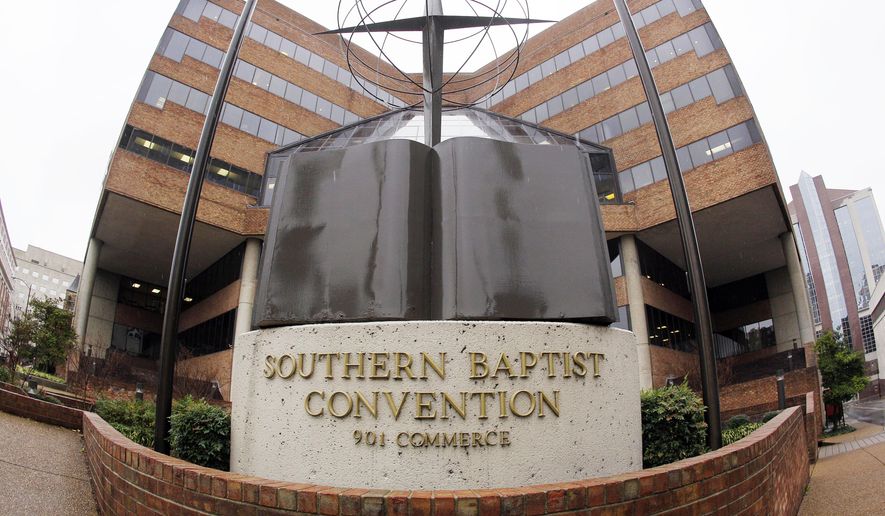Leaders of the Southern Baptist Convention, the nation’s largest Protestant denomination, were accused Sunday of a decades-long cover-up of sexual abuse within the group.
The Baptists should offer “both a sincere apology and a tangible gesture” including a “survivor compensation fund,” the report from D.C.-based Guidepost Associates said.
The report also suggested that the denomination should prepare to “oversee comprehensive long-term reforms concerning sexual abuse and related misconduct.”
The firm recommended maintaining an Offender Information System to “alert the community to known offenders.”
The report also notes that in spite of claims that compiling a database of those suspected of abuse would create “potential liability” for the Baptists, the denomination had begun in 2007 to maintain such a list, but did not share it publicly.
Other recommendations included more resources for preventing, identifying and reporting sexual abuse; “enhanced background checks” in hiring by churches; and a “declaration of principles” to put the denomination on record in handling future abuse accusations.
A group of executive committee officials at the 13.7 million-member denomination “were singularly focused on avoiding liability for the SBC to the exclusion of other considerations,” the report noted.
“Survivors and others who reported abuse were ignored, disbelieved, or met with the constant refrain that the SBC could take no action due to its polity regarding church autonomy – even if it meant that convicted molesters continued in ministry with no notice or warning to their current church or congregation,” the report stated.
The Rev. Willie McLaurin, interim president of the SBC executive committee, and Rolland Slade, its chairman, said Sunday afternoon that the report was chastening.
“We are grieved by the findings of this investigation. We are committed to doing all we can to prevent future instances of sexual abuse in churches, to improve our response and our care, to remove reporting roadblocks,” they said in a joint statement.
They said delegates to the annual SBC business session next month in Anaheim, California, will receive a response to the suggestions made in the document.
“This is the beginning of a season of listening, lamenting, and learning how to address sexual abuse in the Southern Baptist Convention,” the two men said.
The investigation report also revealed that the Rev. Johnny Hunt, Southern Baptist president from 2008 to 2010, “had sexually assaulted” an SBC pastor’s wife on July 25, 2010. They said these allegations were found “to be credible,” while Mr. Hunt’s denials were not.
Other senior leaders in the denomination “had protected or even supported abusers,” the report stated.
Three named leaders were past presidents of the Southern Baptist Convention.
According to the report, the Rev. Steve Gaines, who headed the group from 2016 to 2018, admitted to delaying disclosure of “a staff minister’s prior sexual abuse of a child,” due to “heartfelt concern and compassion for the minister.”
Mr. Gaines, senior pastor of Bellevue Baptist Church in Cordova, Tennessee, later said he should have reported this immediately.
The Rev. Paige Patterson, who served as SBC president from 1998 to 2000, was terminated from his position at the Southwestern Baptist Theological Seminary in 2018 after reports surfaced that he told one student in 2003 not to report a rape, and, in 2015, declared his intention to meet alone with another victim to “break her down.”
And the Rev. Jack Graham, who headed the convention from 2002 to 2004, was accused of allowing accused sexual abuser John Langworthy “to be dismissed quietly” from the staff at Prestonwood Baptist Church in Plano, Texas, and failing to report the abuse to the police.
Langworthy pleaded guilty “to five charges of gratification of lust involving five males” in Mississippi in 2013, which are felonies. He was given five 10-year prison sentences, but they were suspended because of questions about the statute of limitations in the state.
However, Langworthy will still go to prison if he violates the terms of his probation.
A spokesperson for Prestonwood said that “protection of an alleged abuser has never been provided at Prestonwood, and the church categorically denies the characterizations made in this report.”
In 2011, the Rev. Mike Bulter, then a pastor at Prestonwood who worked for Mr. Graham, said Langworthy was “dismissed immediately” when the allegations surfaced, and that the church “in no way” attempted to “cover up” the incident or “silence” Langworthy’s accuser.
The Times has also reached out to Bellevue Baptist Church for comment.
The report quoted attorney D. August “Augie” Boto, general counsel for the executive committee and later its interim president, as blaming Satanic influence when abuse survivor Christa Brown and advocate Rachael Denhollander, sought answers from the leadership.
“This whole thing should be seen for what it is,” the report quotes an internal email from Mr. Boto.
“It is a satanic scheme to completely distract us from evangelism. It is not the gospel. It is not even a part of the gospel. It is a misdirection play,” he wrote. “Yes, Christa Brown and Rachael Denhollander have succumbed to an availability heuristic because of their victimizations.”
Other reactions to the report were swift and sharp.
Russell Moore, the former head of the SBC’s Ethics and Religious Liberty Committee who left the denomination last year, wrote at Christianity Today’s website that “I was wrong to call sexual abuse in the Southern Baptist Convention (SBC) a crisis. Crisis is too small a word. It is an apocalypse.”
According to Sarah McDugal, an author and abuse recovery coach, substantial actions will need to replace expressions of dismay by Baptist executives.
“It remains to be seen whether this investigative report will translate to tangible action on behalf of victims,” she said. “Until there is clear evidence of justice and protection regardless of the impact to corporate public image, survivors of abuse in the faith community are unlikely to hold their breath.”
• Mark A. Kellner can be reached at mkellner@washingtontimes.com.




Please read our comment policy before commenting.